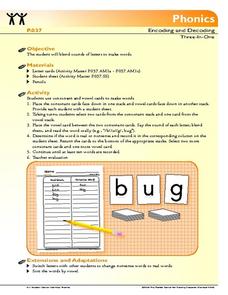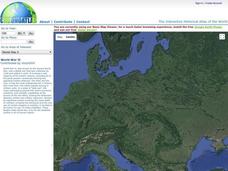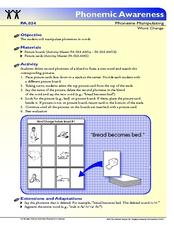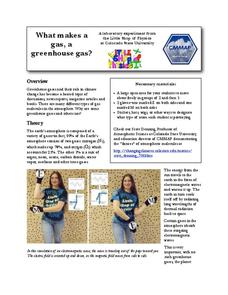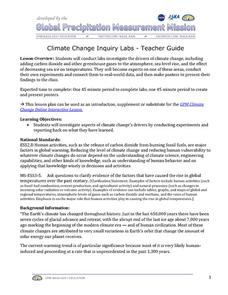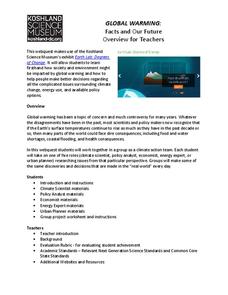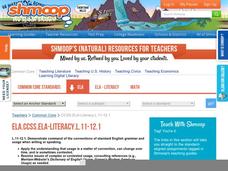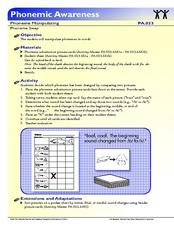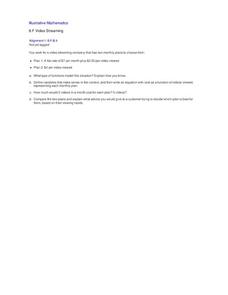Florida Center for Reading Research
Phonics: Encoding and Decoding, Three-In-One
Scholars use the provided pack of alphabet cards to construct basic CVC words, then write down each word they make in one of two columns. Column one is for real words and column two is for nonsense words.
Khan Academy
Project: Make it Rain
Make it rain on your computer screen with this challenging JavaScript programming project. Modify the existing code of one little drop to create a downpour by using arrays and properties of arrays. But why stop there? How about some...
NOAA
I Didn’t Do It…Did I?: Make Your Own Greenhouse Effect
How do greenhouse gases affect the climate on Earth? Pupils explore the concept by first building their own apparatuses to model the greenhouse effect. Then, they record data to measure temperature change and determine...
Illustrative Mathematics
The Price of Bread
As part of an initiative to strengthen our young adults' financial understanding, this problem explores the cost of bread and minimum wage since the 1930s. Learners are asked to find the percent increase from each year and compare it...
Florida Center for Reading Research
Phonological Awareness: Phoneme Manipulating, Word Change
Once your scholars know their letter sounds and recognize them in words, have them try making new words by manipulating phonemes. Pupils are given a word change picture board and a stack of word pictures. They pick a card and place it...
Wild BC
Greenhouse Gas Guzzlers
Teams of six to eight players imagine that they are driving in a vehicle and collect balls that represent carbon dioxide emissions based on their different activities. "Greenhouse Gas Guzzler" cards tell teams how many balls to collect...
Colorado State University
What Makes a Gas, a Greenhouse Gas?—The Carbon Dioxide Dance
Investigate a heated topic in environmental science. Scholars team up to play the parts of gas molecules in the atmosphere. As the teacher moves about, acting as the electromagnetic wave, learners react as their molecules would to the...
NASA
Climate Change Inquiry Lab
With global temperatures on the rise faster than ever recorded, the effects of a heating planet could be devastating. Allow learners to discover just what the world is in store for if the warming continues through a series of videos, a...
National Academy of Sciences
Global Warming: Facts and Our Future
According to the United Nations, climate change affects every country on the planet. This research project encourages scholars to explore the factors that affect climate change from different perspectives: climate scientist, policy...
Shmoop
ELA.CCSS.ELA-Literacy.L.11-12.1
Despite English grammar rules, in the e-world the plural of mouse is mouses. lol. Standard American English is constantly evolving. Introduce your class members to a variety of terms that describe different usage changes (economy,...
NOAA
Climate Is Our Friend…Isn’t It?: Make an Extinction Polyhedron
Climate affects populations in different ways. Scholars research extinct organisms and mass extinctions in part three of the 10-installment Discover Your Changing World series. They create graphic organizers, then fill in the...
NOAA
How Do We Know?: Make Additional Weather Sensors; Set Up a Home Weather Station
Viewers learn about three different weather measurement tools in installment five of the 10-part Discover Your Changing World series. They build weather vanes to collect data on wind speed, barometers to determine air pressure, and...
Florida Center for Reading Research
Phonological Awareness: Phoneme Manipulating, Phoneme Swap
Reading readiness can be a fun skill to foster. Scholars manipulate phonemes to change one word into another. They pick picture cards, say the object's name on the card, then change the final phoneme to create a new word. They then find...
American Museum of Natural History
Make Your Own Weather Station
Scholars build a weather station equipped with a wind vane, rain gauge, and barometer. Following an informative page about the weather, learners follow steps to build their pieces then turn into meteorologists to chart the weather they...
Curated OER
Phonological Awareness: Phoneme Manipulating, Name Changes
Set up a listening center, record the provided script, and see how well your class can manipulate phonemes based on the instructions you've provided. This center-based activity builds the phonological awareness and phoneme manipulation...
Curated OER
Five by Two
Help young mathematicians read and interpret numbers from 1 to 10 and sequence them correctly with this card game. Using a deck of cards and two to three classmates, have one player hand out ten cards to each gamer and then put the extra...
NOAA
It All Runs Downhill
Examine how pollution makes its way into an ocean with help from a model watershed. Scholars use household items to recreate a mini-watershed, equipped with pollutants, that when mixed with rain drain into a model's body of...
Curated OER
My Planet Earth
The earth is a delicate and fragile thing; Why not engage your class in a craft project that will make them aware of our environment? Earth Day is celebrated as recycled materials are used to create earth window hangings. Crayons are...
Teach Engineering
Making Model Microfluidic Devices Using JELL-O
Nothing flows like J-E-L-L-O! In the final portion of a four-part series, pupils create scale models of microfluidic devices out of gelatin and bendable straws. They use their devices to test various flow rates in the delivery of...
Illustrative Mathematics
Video Streaming
Your movie fans will be interested in this resource. They will compare video streaming plans. One plan charges a set rate per month and a reduced viewing fee, and the other has a flat rate per each video viewed. Unfortunately, students...
US Environmental Protection Agency
Weather and Climate: What's the Difference?
Future weather forecasters collect daily temperatures over a period of time. Afterward, they compare their data with monthly averages, as researched on national weather websites, in order to grasp the difference between weather and...
NOAA
The Climate Team: Make a Solar Heat Engine
Learners investigate how solar energy is converted into heat in part two of the 10-part Discover Your Changing World series. They build and test homemade solar cookers to boil water and cook rice. Pupils consider the impact of heat...
NOAA
The Great, Glowing Orb What You Will Do: Make a Solar Heat Engine
How is solar energy able to move wind and water to control the climate? Scholars explore the concept of solar energy in the first of 10 activities in the Discover Your Changing World series. They follow instructions to build homemade...
Royal Society of Chemistry
Mass Changes in Chemical Reactions—Microscale Chemistry
What better way is there to introduce conservation of mass than a few simple experiments? Young chemists conduct two chemical reactions, take the masses of reactants and products, then compare their results to determine...
